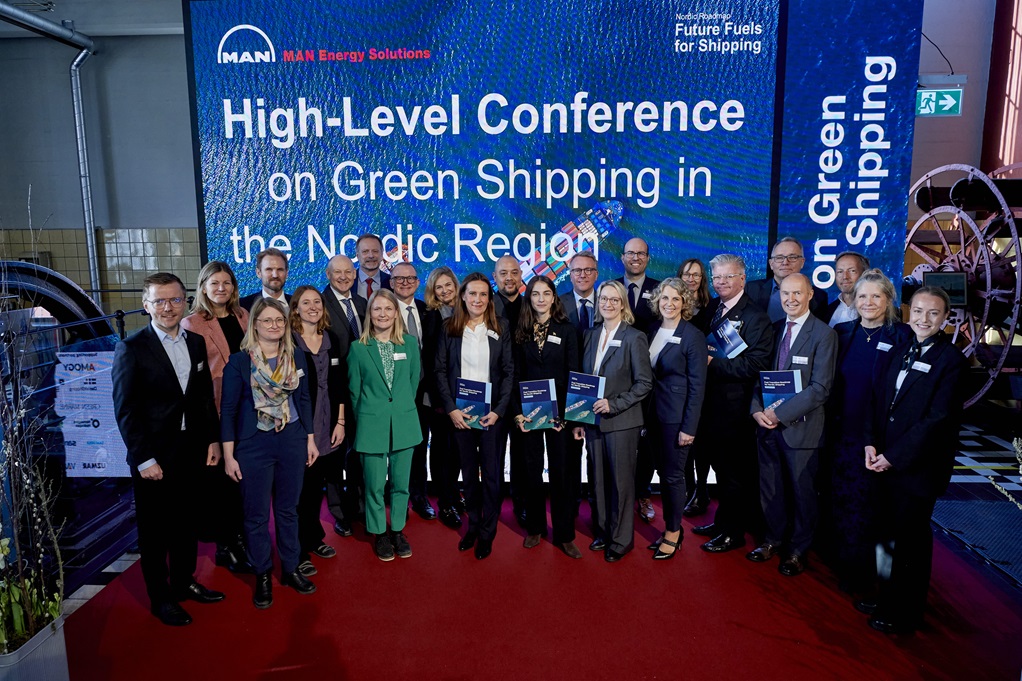The Nordic Roadmap project has unveiled the Fuel Transition Roadmap for Nordic Shipping, a comprehensive document outlining a decarbonization strategy for the region. The report urges Nordic ministers to take immediate action to support the industry in achieving its goals by closing the cost gap associated with the fuel transition. Its findings and recommendations were officially presented to Nordic ministers today at a High-Level Conference on Green Shipping in the Nordic Region, held in Copenhagen.
Alongside their commitment to global maritime emission reduction targets set by the IMO, the Nordic countries have also pledged to meet ambitious regional climate targets for shipping. These include early commitments to net-zero emissions by 2050, advancing a sustainable ocean economy and green transition, cooperation on transport, infrastructure and energy supply, and the establishment of green shipping corridors.
To decarbonize, shipping will need to switch to zero-emission fuels and the roadmap strategy identifies three main barriers to their uptake in the region:
- Demand and costs – linked to the lack of demand for zero-emission shipping and cost-competitiveness of zero-emission fuels.
- Fuel availability – referring to the lack of onshore development of the supply chain, including fuel production and sourcing of raw materials, distribution, and bunkering infrastructure.
- Technology and safety – referring to the low maturity level of fuel technologies and safety regulations, both onshore and onboard vessels.
The report goes on to outline seven building blocks, broken down further into 20 specific actions to be taken towards 2030, to overcome the interlinked barriers. These represent specific work packages that governments and industry stakeholders must collaborate and work on in parallel to upscale the use of zero-emission fuels.
The key recommendations of the roadmap highlight the urgent need for government action to bridge the cost gap for zero-emission fuels and to accelerate the implementation of competitive tenders for green shipping corridors. The strategy envisions the first corridor becoming operational by 2025, followed by three more by 2026, and an additional six by the end of 2028. An immediate priority is to develop a plan for the regional integration of fuel production and infrastructure.
Ida Heimann Larsen, Deputy Secretary General of the Nordic Council of Ministers, said: “The Nordic Council of Ministers is proud to have helped bring about this comprehensive and ambitious public-private cooperation. And we will continue to support the advancement of the 7 key building blocks of the Road Map as part of a wider, cross-sectoral focus on the green transition of our blue economy. These are important stepping stones on our path towards making the Nordic region the most sustainable in the world.”
Knut Ørbeck-Nilssen, CEO Maritime, DNV, said: “We call on Nordic governments to act swiftly on the urgent measures identified in the Fuel Transition Roadmap for Nordic Shipping. Doing so will give the industry confidence to invest in ships capable of running on zero-emission fuels, and the fuel infrastructure needed to support them. Cross border and value chain collaboration will be crucial in enabling the industry to overcome key barriers and to meet the ambitious decarbonization targets. By leading the way, the Nordics can not only drive value creation and boost exports but can also play a key role in the global fuel transition.”
Bjarne Foldager, Senior Vice President and Head of Two-Stroke Business, Denmark, MAN Energy Solutions, said: “This Roadmap is a worthy initiative and, in tandem with other global decarbonisation efforts, represents a concrete way for Nordic shipping to collaborate and push decarbonisation through – among other parameters – the adoption of zero-emission fuels and green corridors. At MAN Energy Solutions, we welcome the opportunity to work with like-minded partners and are more than happy to bring our expertise within marine propulsion and alternative fuels to the table in the pursuit of net zero.”
The Roadmap is developed by the project team led by DNV with members from MAN Energy Solutions, IVL Swedish Environmental Research Institute, Chalmers University of Technology, Menon Economics, and Litehauz, and in collaboration with more than 60 industry partners.
The Nordic Roadmap project started in 2022 and is funded by the Nordic Council of Ministers. It aims to reduce key barriers to the uptake of zero-emission fuels and develop a common roadmap for the whole Nordic region towards zero-emission shipping.
Tags: Green Shipping, Nordic Shipping, Roadmap



Recent Posts
Hyundai Glovis to Retrofit Seven PCTCs with Avikus AI Navigation System
Super Terminais orders three more Konecranes Gottwald ESP.10 Mobile Harbor cranes
Covestro and HGK Shipping Extend Partnership to 2040 with Focus on Wind-Assisted Vessel Retrofit
Artemis Technologies Successfully Demonstrates 100 Percent Electric Crew Transfer Vessel at Aberdeen Offshore Wind Farm
IACS Council Advances Decarbonisation, Digitalisation and Governance Priorities at C91 Meeting in Beijing
Japan Launches Major R&D Project to Advance Shipbuilding with Alternative Fuels
EU Adopts Emissions Standards for Low Carbon Hydrogen to Bolster Clean Energy Market
Trafigura to Implement ZeroNorth’s AI Platform Across Global Fleet